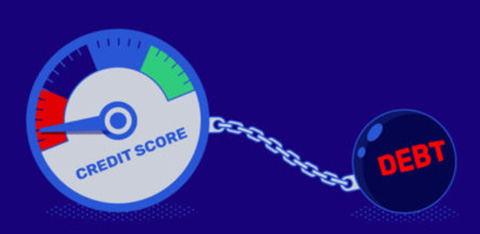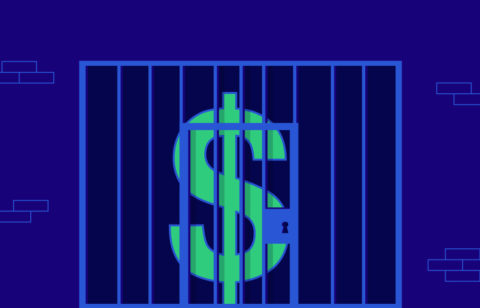Debt settlement offers a way to pay off debts for less than the amount that you owe — and a way to become more financially secure. But this road to financial security can come with some bumps. One of those potential bumps: a hit to your credit score.
While debt settlement affect your credit score for a period of time, it also might put you closer to whipping your credit into shape and eventually raising your credit score.
Why Debt Settlement Can Harm Your Credit Score
When lenders agree to settle your debts, you’ll be paying off debts that have gone unpaid altogether or have been paid late. If that’s the case, it’s likely your credit score has already dropped.
At least at the outset, a debt settlement that shows up on your credit report could cause your credit score to fall 100 points or more. Credit scores typically range from 300 to 850. So, if you recently had a FICO credit score of 670, a new debt settlement on your credit report could pull your score down to 570. As a result, your FICO score might tumble from the “good” category to the “fair” category.
While debt settlement could cause your credit score to drop, it’s often only by about half the number of points as a bankruptcy might. For example, somebody who had a FICO score of 670 might see their score plummet to 470 after filing for bankruptcy. Bottom line: Debt settlement could make it easier to rebuild your credit than bankruptcy would.
It’s important to remember how important a credit score is. A high credit score might make it simpler to qualify for a credit card or loan, and might enable you to obtain low interest rates and other favorable terms. On the other hand, a low credit score might make it harder for credit card companies to qualify you for a credit card or loan, and might result in high interest rates and other less favorable terms.
Factors that affect your credit score
Payment history — specifically making timely payments on credit card accounts, loans and other lending products — ranks as the most important factor in calculating your credit score. If you’re looking at debt settlement, your payment history and your credit score have undoubtedly been battered already.
At FICO, the biggest producer of credit scores in the U.S., payment history makes up 35% of a FICO score. It’s the number one factor among the five factors that FICO considers.
While debt settlement can put you on the path toward healthier finances, it can lead to a decrease in your credit score. That’s because credit card issuers typically close your accounts once your debt has been settled. When those accounts are closed, it could damage two factors that go into calculating your credit score: length of credit history and credit mix.
Length of credit history represents 15% of a FICO score. If your debts are settled and the accounts are then closed, it may reduce the length of your credit history, depending on when you opened those accounts. In turn, that might ding your credit score.
Credit mix represents 10% of a FICO score. If account closures change your credit mix, it could trigger a decline in your credit score.
Bottom line: How much debt settlement dings your credit score depends on the current state of your finances and the amount of debt you’re settling.
Credit utilization and your credit score
While several factors may dent your credit score, one positive effect of debt settlement may be that it benefits your credit utilization ratio. This ratio refers to the percentage of available credit that you’re using.
The amount of debt you owe determines 30% of your FICO score. Part of that 30% equation includes your credit utilization ratio. If your ratio goes down as a result of debt settlement, it could bump up your credit score. For example, if debt settlement leads to the ratio falling from 20% to 10%, you could see your credit score spike.
The future of your credit score
All of that being said, debt settlement is designed to improve your financial situation — and improving your financial situation should eventually lift your credit score. “Over time, FICO favors new positive information over old negative information — this shows that you’re developing and using good credit habits,” according to Fox Business.
Regardless, a debt settlement remains on your credit report for seven years after a debt’s original delinquency date or after the date the settlement is reported. This might hinder your ability to obtain credit and might keep your credit score lower than you’d like it to be.
How Debt Settlements Work
Debt settlement enables you to get back on track financially by paying off some, not all, that you owe on debts. It can be a more attractive alternative than bankruptcy.
When you settle debts, creditors agree to accept partial payment for your debts rather than possibly receiving nothing at all. In turn, the creditors mark your debts as being paid off. These debts will appear on your credit report as being “settled,” meaning the accounts have been paid in full, but for less than the total balance.
You can negotiate with debt collectors on your own to settle debts or you can tap the expertise of a company like National Debt Relief to settle them. Debt relief companies typically earn a fee of 15% to 25% of the full amount of debt that’s owed (rather than the settlement amount).
Keep in mind that some creditors won’t agree to settle debts, even if a debt settlement company is negotiating on your behalf. In that case, you’ll need to take a different approach to addressing unsettled debts, like credit counseling or bankruptcy.
Paying off your debts
If you’re working with a debt settlement company, you’ll be advised to stop making monthly payments on the debts that are being settled. Instead, the money that you’d otherwise earmark for debt payments will most likely go into a savings account maintained by the debt settlement company. Deposits into that account — stretching out over the course of perhaps several years — end once you’ve accumulated enough money to cover the settlement amount.
So, let’s say a creditor agrees to settle your credit card debt for 50% of what you owe. If the amount you owe totals $15,000, then the creditor would theoretically get $7,500 in the form of a lump-sum payment. And the creditor would forgive the remaining $7,500. But be aware that the IRS may tax the amount of forgiven debt.
It’s also possible that while you’re saving up the money to cover a lump-sum payment, you may be hit with late fees and your balance may go up This can cause your credit score to dip even more.
What Sort of Debt Should I Settle?
Both unsecured and secured debts can be settled. But not all unsecured and secured debts are eligible.
Unsecured debts
In the majority of cases, debt settlement focuses on unsecured debts. Unsecured debts don’t involve putting up collateral like a home or a car. Types of unsecured debts that you might be able to settle include:
● Traditional credit cards
● Store credit cards
● Personal loans
● Medical bills
● Gym memberships
While a student loan is unsecured debt, it usually can’t be settled, so it is not included here.
Secured debts
Secured debts typically can’t be settled. However, a creditor may agree to a settlement if they have seized your collateral but you still owe money.
Examples of secured debts include:
● Auto loans
● Mortgages
● Tax debts
● Personal loans secured by collateral
● Government loans
Debt Settlement vs. Staying Current
A Debt management plan requires staying current with your debt — and avoiding late payments —will be kinder and gentler to your credit than debt settlement. That’s because a debt settlement normally appears on your credit report for seven years. Meanwhile, staying current with your debt generally shouldn’t put a negative mark on your credit report.
But keeping up with monthly debt payments means you need enough money to achieve that. If you can’t stay current with your debts, debt settlement is one of the options to consider. It’s aimed at letting you pay less money than you owe, and it can buy you some time to get your finances in shape. And it’s typically preferable to remaining behind on payments or not paying your debts at all, both of which could hurt your credit score even more than debt settlement might.
At National Debt Relief, we take pride in empowering people to regain their financial stability through our proven debt relief program.Contact us and talk to a financial expert who will work with you to find the best option to settle your debt and help you achieve financial independence.







